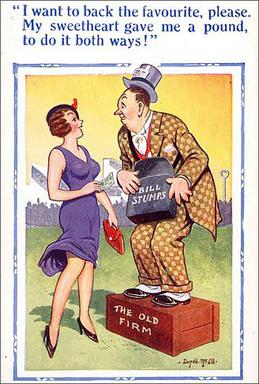Donald Fraser Gould McGill (28 January 1875 – 13 October 1962) was an English graphic artist whose name has become synonymous with the genre of saucy postcards, particularly associated with the seaside.[1] Dr Nick Hartley of the British Cartoon Archive has observed that “I think these [saucy] cards represent two weeks of the year when people went on holiday to a place that had different rules … more and better food, more drink, more sun and more sex.”[2]
McGill’s cards mostly feature an array of attractive young women, fat old ladies, drunken middle-aged men, honeymoon couples and vicars. He has been called “the king of the saucy postcard”, but even at the height of his fame he was earning only £8 per card. Examples of his work can be seen today in the Victoria and Albert Museum, London, but in 1954 it was considered to be in such bad taste that he was prosecuted under the Obscene Publications Act 1857, and fined £50 plus £25 costs.[1]
Early life
McGill was born at Regent’s Park, London on 28 January 1875, to John Streeter Davenport McGill, a stationer, and his wife Rosina Bisgood. Some members of the McGill family had moved from Glasgow to Canada during the 18th century and made a fortune in fur trading,[1] but whatever of their wealth Donald’s father had inherited, he had squandered.[3][a]One ancestor, James McGill (1744–1813) was the founder of McGill University.[1] Donald attended Blackheath Proprietary School, where at the age of seventeen he suffered an injury that necessitated the amputation of a foot. A talented artist, he enrolled with the New School of Art, a correspondence school run by the cartoonist John Hassall.[1]
McGill began work as a naval draughtsman at Maudsleys in 1893, before moving on to an apprenticeship at the Thames Ironworks, Shipbuilding, and Engineering Company in 1897.[1] In 1900 he married Florence Hurley, whose father was the owner of Crowder’s Music Hall in Greenwich.[4]
Career
McGill continued to paint during his free time, and began to exhibit some of his work in a shop window in Sussex, where it was seen by Joseph Ascher, owner of the Pictorial Postcard Company. Ascher bought the rights to publish some of McGills “lighter work” – pictures of Victorian ladies displaying their ankles – as postcards, for six shillings each. He also commissioned McGill to provide six new pictures a week, which McGill did by using as his inspiration the jokes he heard in his father-in-law’s music hall.[1]
In 1907 McGill left the Thames Ironworks Company to become a partner in another postcard company, Hutson Bros. He left three years later and became a freelancer, selling his cards to Ascher’s company. Following Ascher’s internment as an enemy agent – he was a German national – McGill joined the Inter-Art Company, where he remained until 1931 After another period of freelancing, in 1936 McGill rejoined Ascher, who was by then working under the name of D. Custance. From 1952 until his retirement ten years later McGill was as employed as the company’s director in charge of postcard design, at an annual salary of £20 plus £8 per postcard.[1]
Despite producing more than 12,000 designs during his career,[5] of which it is estimated that 200 million copies were produced,[6] McGill never received a penny in royalties. His most popular card was one of a girl praying, with the caption “Excuse me Lord while I kick Fido!”, which sold six million copies; McGill received just six shillings.[1]
Death and critical assessment
McGill died from a gastric ulcer and diverticulitis of the colon at St James’s Hospital, Balham, on 13 October 1962,[1] and was buried in an unmarked grave in Streatham Park cemetery.[7]
George Orwell, who in 1941 produced the first critical assessment of McGill’s work in an essay published in Horizon, “The Art of Donald McGill”,[4] considered him to be “the nation’s true folk artist”.[7] In a very real sense, the makers of the Carry on series of films can be seen as the natural inheritors of McGill’s sense of humour.[1]
Notes
| a | One ancestor, James McGill (1744–1813) was the founder of McGill University.[1] |
|---|


